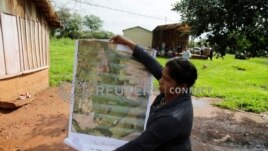26 May, 2019
Rumilda Fernández's indigenous community has always cared for its ancestral lands in Paraguay. Her community marks borders with an ancient system of names for trees and waterways. Now, the group is turning to technology to defend itself from nearby farms and the clearing of forests.
Fernández is one of the group's first technology-equipped forest watchers. She travels along the paths of the Isla Jovai Teju community's land to map the area with application software on her smartphone. She also uses Global Positioning System (GPS) technology to identify her position and follow her movement.
The work is important to the survival of her Mbya Guaraní ethnic group. The group has been slowly losing control of its ancestral lands.

Community leader Cornelia Flores holds a map showing the community's territory which is being monitored with a smartphone app and GPS to protect lands and preserve forests, in Isla Jovai Teju, Paraguay May 9, 2019. (REUTERS/Jorge Adorno)
"The forest was our supermarket and we did not need anything more. Now with the clearing, everything has changed," community leader Cornelia Flores told the Reuters news agency.
"Before, we did not know how many hectares our land was. Now we have the map and the actual size," she added.
The technology push is part of a project with the United Nations Food and Agriculture Organization. As part of the effort, the project is training eight young people from four Mbya communities in Caaguazu, an area about 200 kilometers east of Asunción.
The forest watchers take pictures with a cellphone app of natural landmarks. They identify the images with ancestral terms such as "yvyra pyta", "guajayvi" or "ygary." These points are used to make a map, showing the borders of the area.
"It was easy to learn, though the technology element was tougher for me," said Fernández. She had never used a computer or a GPS before.
The Mbya leaders believe technology will help them protect lands that, in the past, have been occupied by very large farms. Their hope is to keep local forests as an important place to find food and medicinal plants.
Loss of land and other natural resources is a painful issue for the indigenous people. They represent just 2 percent of Paraguay's total population. Seventy-five percent of them live in poverty or extreme poverty, according to government records. Experts say much of the group's poverty is linked to loss of their land.
The country's minister of social development, Mario Varela, told Reuters impoverishment came from the exclusion of indigenous people. They "had never been included, nor their original culture respected" in Paraguayan society.
"The problem for the indigenous is that we have been in Paraguay for 500 years and they have never helped us," said Teófilo Flores. He is the leader of the Pindo'i community of 750 people in Caaguazú.
"We need to know how to preserve the forest... giving us the tools and support so that we ourselves also don't deforest the lands," he added.
Illegal activities
Paraguay is divided into two main parts: an area with industrial farming in the east; the other is Chaco, a livestock area where clearing of forests is permitted and where laws are not always enforced.
The country has lost nearly 500,000 hectares of native forests in the east since 2004, official records shows. That was the year when a "Zero Deforestation Law" was approved. The measure was supposed to ban the mass cutting of woodland.
Cristina Goralewski is president of Paraguay's National Forestry Institute. She says corruption was a large part of the problem. The illegal clearing of forests has been permitted to continue. She hoped the use of technology will change that.
Mario Abdo took office as president last year. He has condemned the corruption and promised "zero tolerance" for officials who are found guilty.
"We know that there's ...corruption that supports this deforestation," said Goralewski, a 28-year-old engineer. She pointed out that, in five years, officials had only stopped 20 trucks carrying illegally cut trees.
"The priority for the government is to stop illegal deforestation in the eastern region and use technology for that because we see that the controls are just not working."
I'm Susan Shand.
The Reuters News Agency reported this story. Susan Shand adapted it for VOA Learning English. George Grow was the editor.
Write to us in the Comments Section or on 51VOA.COM.
________________________________________________________________
Words in This Story
indigenous – adj. produced, living, or existing naturally in an area or environment
application software – n. a computer program used in an electronic device
landmark – n. an object that is easily seen and recognized from a distance
tougher – adj. more difficult
according – adv. as stated by or in
livestock – n. animals used for creating money, such as chicken or cows
tolerance – adj. the ability or willingness to deal with something